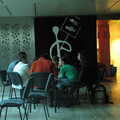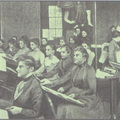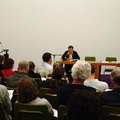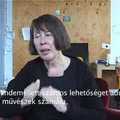Imaginary Property by Florian Schneider and Multitude e.V. Jan Gerber, Susanne Lang, Sebastian Lütgert and Florian Schneider in collaboration with Willem Jan Renders
....There were questions regarding the very nature of ownership of an image or an idea. How does a simple object come to stand in for an entire complex network of knowing, legitimating, conserving, and “anointing with cultural status” (all of which operate under the aegis of ownership)? Imaginary Property (Florian Schneider and Multitude e.V.) asked, “What does it mean to own an image?”...Irit Rogoff: Turning
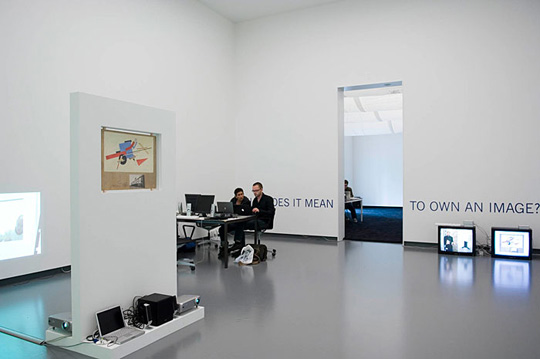
Florian Schneider and Multitude e.V., Imaginary Property, 2006 © Van Abbemuseum
At the end of the 20th century new masses and migrant populations have become visible by claiming a right to access europe and to participate in globalization. At the same time information and communication technologies have generated and articulated new networks of information and knowledge distribution, but also entirely changed the ways in which we imagine access to information and knowledge.
Like the car and the assembly line for Fordism, post-fordist production can be emblematized by mobile phones and increasingly advanced portable communication devices. Mobility is not any longer limited to the arrival and departure at the workplace -- plus maybe some weeks of paid vacation. In times of biopower and biopolitical production it is all about the mobilisation of the entire life as such and in the broadest sense.
Far from being confined to another well-meaning gesture or a moral standard, freedom of movement appears as the precondition for both, autonomy and control, amidst ever convoluted regimes of information and migration. Cultural, social and political rights are by no means guaranteed but subject to management: Temporarily granted in real time they can get revoked as quickly as they got accorded without any need
for further mediation.
What could then characterize up-to-date strategies of refusal, self-determination and resistance against these new forms of power? Which scopes and potentials are arising for new forms of communication, cooperation and collaboration? What is the political impact of
spontaneous networking and ad-hoc-organizing?
In order to start to understand the new trajectories of networked power in the contemporary societies of control this project tries to analyze the emerging correspondances between migration regimes and information regimes: postmodern border management as the ongoing attempt to control migrations and freedom of movement on one hand, and on the other: digital rights management as the attempt to support and regulate new regimes of accumulation based on "imaginary property". (© liminalzones.kein.org)
Links: Imaginary Property Jan van Eyck Academie
Bio - Florian Schneider
Florian Schneider is a filmmaker, media artist and activist based in Munich and Brussels. As a curator, he is concerned with film, documentaFlry formats, and the potential of networked environments – all always in a political context. His central interest lies in transgressing boundaries – between mainstream and independent media, art and activism, theory and open-source technology. Most recently, he has initiated and co-curated the multimedia performance project "Dictionary of War" (2005-now). In 2010 he was one of the co-curators of the first edition of the Berlin Documentary Forum at the Haus der Kulturen der Welt in Berlin. He teaches theory at the Art Academy at the NTNU Trondheim and he is an advising researcher at the Jan van Eyck Academie Maastricht. At Goldsmiths College in London, he is working on a doctoral project on the subject “Imaginary Property”. (© opendemocracy.net)
Bio - Jan Gerber
Jan Gerber is an artist and software developer from Berlin. He develops Internet platforms for the production and distribution of video material (www.v2v.cc, www.0xdb.org, www.pad.ma, www.dictionaryofwar.org). He also researches and organizes public events on questions of intellectual property and piracy through projects like Pirate Cinema (www.piratecineam.org) and The Oil of the 21st Century (www.oil21.org). He works on free and open video codec Ogg Theora and related tools ffmpeg2theora, Firefogg. (© timeinventorskabinet.org)
Bio - Susanne Lang
kein.org: http://neuro.kein.org
http://borderlineacademy.org
Coming from a grass roots youth organizing background in East Germany, Susanne has been active in small town communities since 1991, trying to introduce a notion of democracy in regions that suffered strongly from the influence of neo-right-wing groups. Together with colleagues and friends she organized many campaigns against the rise of neo-fascist ideologies and organizations. One such campaign, "Emergency Entrance" was
awarded the Aachener Peace Award in 2000. For the last four years Susanne has worked with artist-activist Florian Schneider setting up a network of active young people from all over Europe, to struggle against xenophobia and exclusion with the means of new media. Lang completed her university degree in 2001 at the Department of Psychology, Humboldt-
University of Berlin. She is an organizational psychologist, media consultant and festival producer who brings together new media, philosophy and activist engagement. (© Copyright 2006 Ultra-red, Encuentro, published 2006, by Public Record, Los Angeles)
Bio - Sebastian Lütgert
1972 in Bielefeld; lives in Berlin; participates in exhibitions since 1996. Lütgert is part of the Copyleft-movement and has set up a server for theoretical and literary texts.
Willem Jan Renders - Manager Public Programs Van Abbemuseum
Multitude e.V. - Deepa Naik
Has worked with Art for Change, public works and the Serpentine Gallery, while co-ordinating projects with Irit Rogoff (Goldsmiths) including: De-Regulation (MuHKA 2006, Herzliya Museum of Contemporary Art 2007); A.C.A.D.E.M.Y: Learning from the Museum (Van Abbemuseum 2006); SUMMIT: non-aligned initiatives in education culture (Multitude e.V. 2007); and Eye Witness (Birkbeck School of Law 2008). She continues to explore a set of questions that have resulted from her interest in post-colonial theory, the intersection of cultural movements and legal systems, critical art practice and alternative pedagogies. In 2007, together with Trenton Oldfield, Deepa Naik formally established This Is Not A Gateway, a not-for-profit organisation that creates platforms for critical investigations into cities.(© thisisnotagateway.net)



